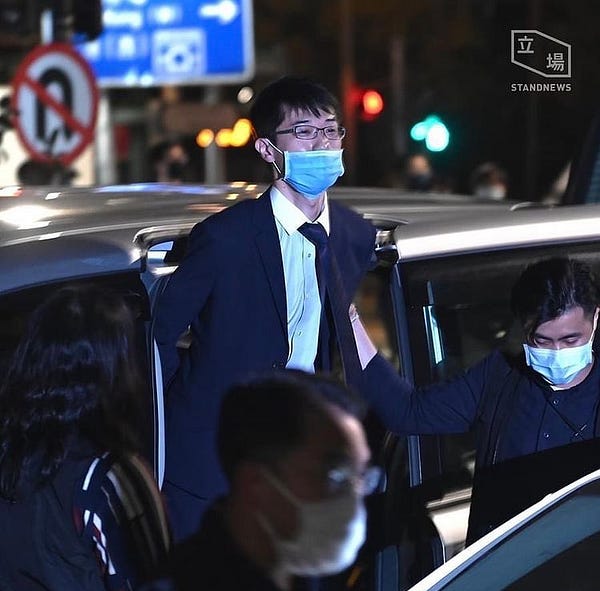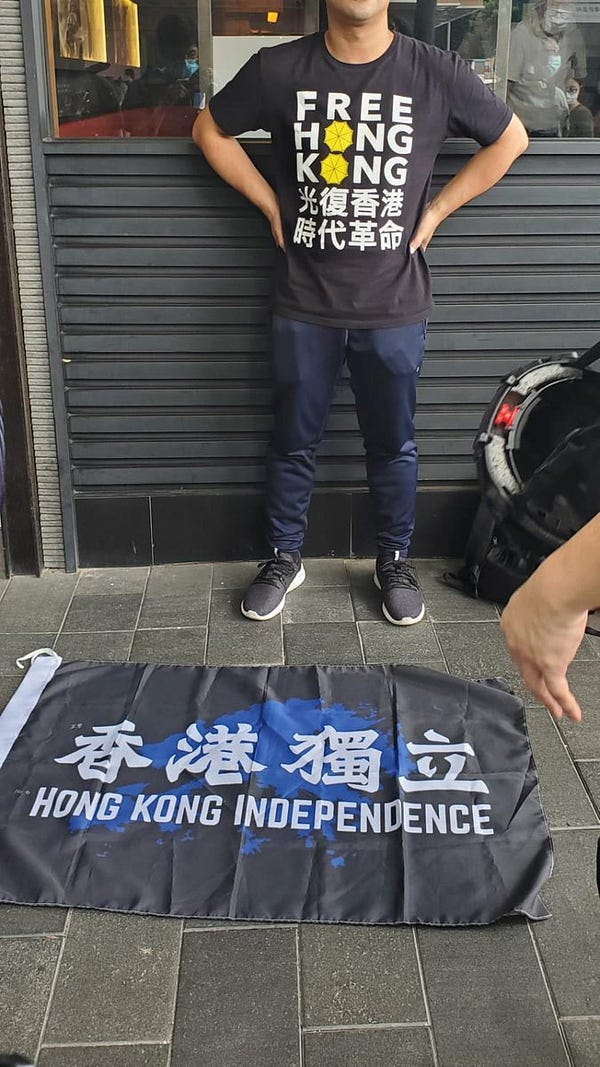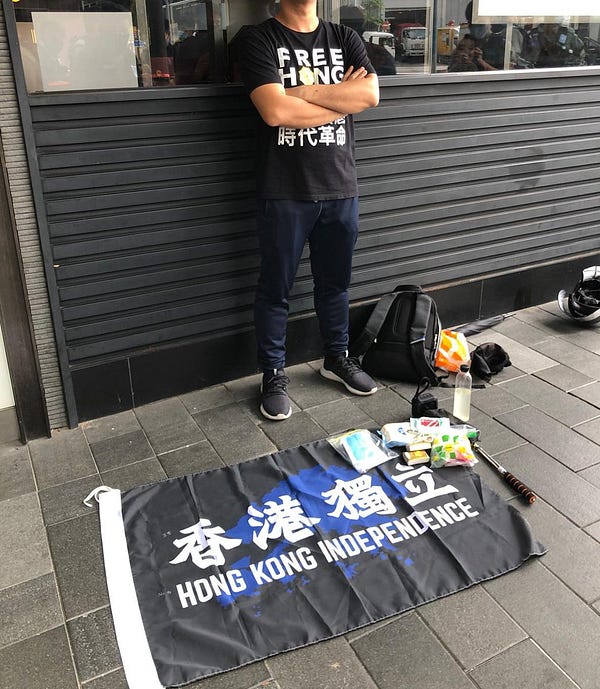What does the National Security Law actually say again?
The Chinese government is only just getting started in its bid to completely crush the pro-Democracy movement and assert its dominance over Hong Kong society.
It’s been a wild few days in China-related news. In Hong Kong, the government has arrested 47 pro-democracy activists for subversion, all of whom appeared in court on Monday welcomed by crowds of reporters, protesters, and police. The Chinese government has decided to hit back at critics of its Xinjiang policy by pointing out that the female whistleblowers are untrustworthy, and backing up this statement by releasing their private medical information to the public. They’re also threatening to release a report on US Human Rights violations because… you know… he who casts the first stone and all that. In Canada, Huawei’s CFO Meng Wanzhou enters the final stage to battle accusations of fraud and conspiracy to violate US sanctions against Iran. Also Shanghai just opened the world’s largest planetarium. That’s nice.


I spent a long time choosing which story to go into detail about. It’s been a hard decision to make, but I decided to go with Hong Kong, mainly because the city holds a special place in my heart, but also because it has the splashiest headlines by far.
I thought a good exercise would be to go through the National Security Law (NSL) in detail so that we know not only what it says, but how it has the potential to be interpreted, especially from China’s perspective. Almost as importantly, we should look at how the law has actually been applied since it was enacted less than a year ago.
I know there were some overviews done when it first came out, but like most news headlines, detailed memory about the actual contents of the story tend to fade relatively quickly. The current situation with Hong Kong’s 47 activists is just the beginning. By understanding the document in detail, we may be able to project how the heavy hand of the Chinese government will operate to quell future perceived ‘unrest’ on the island.
What is NSL?
Following almost a year of anti-extradition protests and clashes between Hong Kong police and local protesters, China decided to enact the NSL on 30th June 2020. Their stated reason for doing this was to bring ‘stability’ back to the territory, and to get something done that should have been done a long time ago. Hong Kong is technically supposed to have a security law anyway, but one was never enacted because the move was so unpopular.
The purpose of the legislation when it was brought in, according to China, was to “stem the growing risk of separatism and restore order in the Hong Kong Special Administrative Region, so the city's residents could resume normal economic and other activities.” In reality, the new law gives the Chinese government broad sweeping powers over Hong Kong’s domestic affairs, as the exact definitions of key terms such as ‘security’, ‘subversion’, and ‘collusion’ are left open to interpretation.
Almost no one was able to read the final version of the document before it was enacted. There was no consultation with judges, legal experts or law officers. And apparently not even Carrie Lam, Hong Kong’s Chief Executive, got to read it before it was published. Many were horrified and dismayed by its contents, with one prominent Hong Kong lawyer citing the law as “worse than the worst-case scenario he had predicted.”
Many saw this document as the final nail in the coffin for a free Hong Kong.
What does the NSL actually say?
There are plenty of existing summaries of the law online, links to which you can find at the bottom of this newsletter in the ‘Sources’ section. What I want to do is go through the letter of the law myself, outline it in a bit more detail, and pick out some parts that I think are noteworthy. At 27 pages it’s not a very long document (our first red flag), so this shouldn’t take too long.
The law is broken down into 5 chapters.
Chapter 1, General Principles: tells us the purpose of the law (tl;dr safeguarding national security); that the Chinese government can point out breaches while it’s the role of Hong Kong’s judiciary to enforce them; and that it applies to institutions, organisations and individuals equally.
It also has a bit in there about apparently granting the “freedoms of speech, of the press, of publication, of association, of assembly, of procession and of Demonstration,” but so does the Chinese Constitution, so you can just ignore that part.
Chapter 2, The Duties and the Government Bodies: The law is to be enforced by the Committee for Safeguarding National Security, which is also responsible for keeping closer tabs on “schools, universities, social organisations, the media, and the internet” (the home of dissenters), as well as promoting a positive image of the law in schools (put a pin in this point). Any breach of the law gets passed on to the Chief Executive, who then passes that info on to the central Chinese government.
Both the police force and the Department of Justice have to establish special divisions for the enforcement of the security law. Also, the Financial Secretary of HK has to set aside a special budget for the enforcement of the law, and for the hiring of people to enforce it, which apparently is not “subject to any restrictions.” Seems like a wise career choice for someone looking for a role in a growing field.
Chapter 3, Offences and Penalties: Finally, we arrive at the juicy stuff. As we should all know by now, there are 4 main offences as outlined in this law:
Secession. Any attempts (successful or otherwise) to separate Hong Kong (or any other part of China) from China, changing Hong Kong’s legal status(???), or trying to give part of Hong Kong away as a present to another country.
Subversion. Any attempts (successful or otherwise) to undermine, overthrow, interfere with, disrupt, attack, damage China or the Chinese ‘central power’ (CCP), people working for that central power, or place and institutions run by that central power.
Terrorist Activities. Any attempts (successful or otherwise) to coerce the government, an international organisation, or the general public in order to pursue a political agenda through any of the following means: violence, explosions, arson, biochemical weapons, transport or public services disruption, or ‘other dangerous activities’.
Collusion with a Foreign Country or with External Elements. My personal favourite. Any attempts (successful or otherwise) to steal, spy, or buy for foreign countries, institutions, organisations, or individuals any information to do any of the following: wage a war against China, disrupt the implementation of laws in Hong Kong, rig elections in Hong Kong, impose sanctions against China, provoke hatred among the people of Hong Kong against China.
I actually didn’t have to paraphrase very much, as the law is so vague in these sections that I’m pretty sure I’m breaking it just by writing this newsletter. Most of these offences are punishable for between 3 years and life imprisonment, although you can get a reduced sentence for snitching. Those who break the law are banned for running for any public office in Hong Kong, or can be deported if they’re not a resident. This law also applies to non-residents, i.e., people who don’t even live in Hong Kong or China (see Article 38).
The law is not limited to perpetration, by the way. It clearly states people who can be punished include “a person who organises, plans, commits or participates” in any of the acts above, or who “provides support, assistance or facility such as training, weapons, information, funds, supplies, labour, transport, technologies or venues to a terrorist.” Aiding or abetting someone involved in one of these acts is also a punishable offence.
If you’re having an off day, try not to mutter ‘f-k this country, and f-k the government’ under your breath, because you will be going to prison.
Chapter 4, Jurisdiction, Applicable Law and Procedure: This section tells us that trials can be partly or completely closed to the public and press, while the results will be made open and available to all. Those accused of committing a crime have no choice but to surrender travel documents in case they try to flee; submit all personal belongings for inspection; forfeit any ‘proceeds of crime’; delete inciting information; and to have their communications spied on (Article 43).
No jury, only judges.
Chapter 5, Office for Safeguarding National Security: In this final chapter, we learn that the Central Chinese government has the right to establish its own Office for Safeguarding National Security in Hong Kong. They basically spy on people and decide what is and isn’t a breach of the law. It also has the power to take over any case it feels the local government isn’t ‘enforcing effectively’, while they themselves cannot be investigated by the local government under an immunity clause (Article 60).
‘Breaches’ of the NSL
As fun as it is to poke holes in the simultaneously obtuse and extremely readable official legislation, we can probably tell more about the law by how it has been enforced than how it has been written.
The first breach of the law came sooner than probably most expected, and the authorities did not hesitate to flex their newly found powers. On 1st July, just one day after the law had been enacted, a man was arrested for waving a “Hong Kong Independence” flag at a protest. Life comes at you fast.



In October 2020, a primary school teacher was sacked for promoting Hong Kong independence in the classroom, and a new rule was instituted that demanded all civil servants to pledge allegiance to the city, or risk being charged with subversion.
In November 2020, an activist and former member of pro-independence group Studentlocalism was arrested for ‘aiding fugitives’ who had been arrested for inciting secession. A local mask manufacturer, Yellowfactory, also had to suspend business after one of its designs was accused of violating the NSL by promoting political messages on its packaging.
In December 2020, former opposition lawmaker Ted Hui fled to the UK and had his accounts frozen by HSBC while the police investigated “collusion with foreign forces.” 8 Chinese University of Hong Kong students were arrested for holding a pro-democracy demonstration and chanting banned slogans and were charged with inciting secession. Apple Daily founder and all around local tycoon Jimmy Lai was charged with colluding with foreign governments because he tweeted too much.
In January 2021, an anti-government, pro-democracy website, HKChronicles, was banned, the first use of the law to censor information.
One of the most recent moves has been the issuance of a set of guidelines by the Education Bureau banning students and teachers from taking part in political activities or discussing political views in schools. A number of books and materials that could be considered a danger to national security will also be removed from the curriculum.
On March 1st 2021, the Chinese University of Hong Kong’s (CUHK) newly elected student union was forced to step down after the university made the move to distance itself from the body, cutting off financial ties and forcing it to register as an independent society. They cited the group’s election materials, which accused the university of threatening them and stated that “the national security law infringed upon basic rights and freedoms and was a disgrace to the dignity of Hongkongers.”
And finally we have the ongoing case of the HK 47, who were charged with "conspiracy to commit subversion" for “organizing, planning and participating in a primary election for the city's democratic opposition last July.”
These charges range from the spurious (the mask factory one is really pushing it) to the directly political. They show that the law really can be taken as loosely as possible, and there’s every possibility of being threatened or made an example of for a minor offense, especially if you have any sort of pre-existing public clout.
They also demonstrate that the CCP is taking the education aspect of the law just as - if not more - seriously than the simple public enforcement. There seems to be a high concentration of cases revolving around schools and universities. There is also some danger of private firms being dragged into political issues (see HSBC), as well as the public sector which seems to be becoming more and more politicised.
The future of the NSL?
What does a close reading of the NSL coupled with its enforcement so far tell us about the future for this legislation and certain freedoms in Hong Kong?
Something I think people don’t really talk about is the promotion of the law in schools. I understand that people are focused on the more immediate stuff (e.g. being arrested for waving a flag), but these more long-term parts of the policy are somehow more insidious to me. The efforts to normalise the law in schools by using propaganda (yes, it’s propaganda) is part of the CCP’s grander scheme to promote Chinese nationalism in Hong Kong more generally, along with other education laws that it has introduced over the past couple of decades.
Something else I find rather interesting (read: sneaky) about the law is that it gives the Chinese central government the power to decide what a breach of the law is, but makes the Hong Kong judiciary deal with the actual enforcement and punishment system. Besides making the CCP look really lazy, it highlights the central issue people have with this law quite well: Hong Kong is now beholden to mainland dictates, regardless of the status of ‘one country two systems’. This is essentially what we’re seeing with the ongoing trial of the Hong Kong 47 (I’m expecting a Sorkin movie in 5 years). The people who want to see them punished are in China, but the people in charge of that punishment are Hong Kongers. It essentially pits the people against each other: Hong Konger vs Hong Konger.
This dynamic can only cause further strain among Hong Kong’s population as time goes on. Political divides have already caused rifts among ordinary citizens, between friends and family, those who just want to live a peaceful life, and those who actively want to fight against what they view as mainland oppression. (I do not have space or time to write about it, but please read this article about the “Milk Tea Alliance”, you’ll thank me later).
No one from the ‘democratic’ side of things will be elected to Hong Kong’s parliament (Legco) ever again, not if the CCP have their way like they have done so far. Soon all that will be left is the law-abiding, line-towing CCP affiliates versus the masses of rioters, subversives, secessionists and terrorists. Then, when the tension reaches a fever pitch, the CCP will have ‘no choice’ but to swoop in and take any semblance of self-rule away from Hong Kong, citing fears of mass chaos and the financial collapse of the island non-nation.
This prediction may seem a bit over the top, but I have seen some articles and Twitter users asking why the CCP is pushing so hard and far with the current HK 47 trials. I personally think the only reason is to stoke tensions. Come 2047 or not, sooner or later the CCP will have created a situation in which it is the only logical solution. It will waltz in, father figure to the masses, and state with much authority that the time to let things play out has passed; the time for the central government to take full control is now.
When that time comes, we’d all better be ready to choose our sides carefully. Remember, you too can be arrested and extradited for suggesting that the CCP’s way of doing things may not be in the best interests of the people after all.
Sources
Amnesty International, “Hong Kong: New national security guidelines on schools further stifle freedom of expression on campus”
BBC, “Hong Kong security law: What is it and is it worrying?”
CNN, “47 Hong Kong opposition figures charged under national security law”
HKFP, “Explainer: How the national security law changed Hong Kong – month 4”
HKFP, “Explainer: How the national security law changed Hong Kong – month 5”
HKFP, “Explainer: How the national security law changed Hong Kong – month 6”
HKFP, “Explainer: How the national security law changed Hong Kong – month 7”
HKFP, “‘Worse than the worst-case scenario’: Lawyers dismayed at Hong Kong national security law”
The Economist, “Tea and tributaries: In no region is China’s influence felt more strongly than in South-East Asia”
The New York Times, “New Security Law Gives China Sweeping Powers Over Hong Kong”
